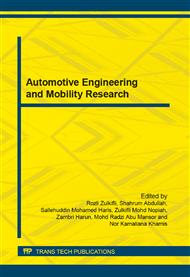p.469
p.474
p.480
p.485
p.493
p.498
p.504
p.510
p.517
Independent Torque Control of an Independent-Wheel-Drive Electric Vehicle
Abstract:
This paper focuses on designing a controller to enhance the traction and handling of an Independent-Wheel-Drive Electric Vehicle (IWD-EV). It presents a traction torque distribution controller for an IWD-EV in order to maintain vehicle handling and stability during critical maneuvers. The proposed controller is based on the Direct Yaw-moment Control (DYC) and Active Front Steering control (AFS) which intended to increase the handling and stability of the vehicle respectively by applying the yaw rate and the lateral acceleration as the control variables. The performance of the controller is evaluated by numerical simulations of two standard high speed maneuvers which are the double lane change (DLC) and J-Curve. The proposed scheme presents a new controller design for IWD-EV which can effectively improved the vehicle handling and stability.
Info:
Periodical:
Pages:
493-497
DOI:
Citation:
Online since:
October 2014
Authors:
Price:
Сopyright:
© 2014 Trans Tech Publications Ltd. All Rights Reserved
Share:
Citation:


